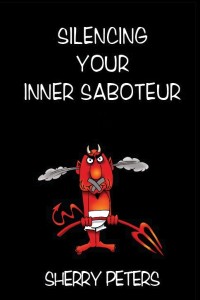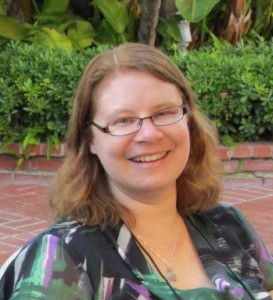A guest post by Sherry Peters.
 Be sure to read A Mountain of Goals, Part One, published yesterday right here on the Fictorians.
Be sure to read A Mountain of Goals, Part One, published yesterday right here on the Fictorians.
I always knew that if I were ever published, I would do everything I could to make my books succeed. The same is true for self-publishing. I’m not going to do what I did with my previous book, Silencing Your Inner Saboteur, which I gave very little promotion (though I may be stepping that up soon as well), because that book was a bit of an experiment and a useful tool.
Once I made the decision to publish Mabel, I began doing a lot of research on the self-publishing/indie industry. It is my responsibility to make my book succeed. I have no one else to blame. Some days I love it. Some days it is incredibly overwhelming. My to-do lists are pages long every week. I could probably make a book of those alone once they’re all compiled!
Aside from the obvious “write the best damn book possible” advice, building a platform is the main form of advice. Platform means building a mail list, blogging, sending out a regular newsletter, facebooking, tweeting… to paraphrase William Shatner, it should be “all Sherry all the time.” I’m supposed to be super interesting and fun and likeable, and apparently highly opinionated in a likeable fun way. Now, I think I am a likeable person. I’m not sure how interesting I am.
What’s interesting about me? What do readers want to know? I’m not really of the generation that wants to know everything about my favorite author. Just write another book; that’s all I want from them. I don’t follow celebrities, and the only authors I friend on Facebook are the ones I already know personally.
You can get a lot of advice on pricing and giveaways, including free books. I must say, I find this a touch on the offensive side. Not that I’m actually offended by the idea, maybe just hurt or disheartened. I can’t imagine a traditional publisher putting out a book on Amazon for free for a day, or even at $0.99 for a day in the hopes of driving up the sales numbers. It feels like I’m cheapening my work, my product. It may be to my detriment, but I’m not sure I’m going to do that.
I realize that I’m at a disadvantage, putting out Mabel this August. I haven’t finished Book 2 in the series yet (though I’m hard at work on it). And putting out a single book means I don’t have what is called a product “funnel,” where readers can get the first book at a discounted price to lure them into buying the second book. That’s why I’m giving away three Mabel Goldenaxe short stories prior to the release of the novel as an incentive/thank you for signing up for my newsletter.
Promotion doesn’t end there, of course. I printed beautiful postcards (through Vistaprint) with the cover on it, and a “call to action”—for people to go to my website, sign up for my newsletter, and get a story—which I put out at my local convention (Keycon). I’m having my book launch at When Words Collide this August, and I’m going to have one at McNally Robinson Booksellers in Winnipeg.
Promotion, then, is probably the biggest headache which all authors, traditional or indie, have to deal with. That is the reality of the business. Publishers have less and less money to give to it, so we’re doing a lot of the same things. The biggest difference is that traditionally published authors get distribution, and get reviewed by major newspapers (well, they can, if they’re a big enough name, or local, or a specialist). That is to say, most newspapers still won’t consider reviewing a self-published book.
What about the book production? I go for coffee every other week with a friend, usually to a Chapters, and half our time is spent looking at books. I’ve turned this into a great time for surveying what’s out there, what I like, what I don’t, what works and what doesn’t. It’s amazing how many crappy covers there are. And there are some spectacular ones. The artwork matters. It matters. It matters. It matters. So do the interior aesthetics. If the type is too small or too crowded, if it doesn’t feel good in my hand, I don’t pick it up. If the art looks like the pulp editors would have rejected it for being cheesy, I won’t pick it up. If I can’t read the title or the author’s name, I won’t look at it.
There are three main categories for YA covers. Take a look the next time you’re in a bookstore or on the Amazon/Chapters/Barnes & Noble websites. First we have the uber close-up of the face. Usually this means the focus is on the eyes or the lips. Sometimes this pulls out a little further to where we have more of the body, but part is cut out of the frame so it’s only half a face. Sometimes it’s just the torso to show off a plaid pleated skirt (a lot of pleated skirts on headless girls). These are usually in the genre of what used to be called “chick-lit.” I’m not sure what they would be called now.
Then we have the full body, most often with the back to the reader, the head in half-turn. This fits mainly into the urban fantasy or paranormal romance category. But not always. There are some like this that are much more pure romance, as evidenced by the character on the cover wearing a ball gown of some kind.
And finally, we have the symbol on the cover. I think this was made most popular by The Hunger Games. Divergent is another example of this. We see this much more often in the non-YA books, like the adult editions of the Harry Potter books, and the Game of Thrones books are going the same way.
Given the prose style and content of Mabel, I opted for the semi-close-up. I had intended to go with a symbol, but there were already a few books out there with axes on them and while it could be stunning and unique, I couldn’t picture it. So I did my research. I spent days researching fantasy artists, finding out about their work, their rates, etc. To be honest, once I saw Jordy Lakiere’s dwarves, I knew he was the one I wanted. I didn’t think I could afford him, or that he’d want to do a cover for me, but I took a deep breath and e-mailed. Needless to say, it worked out great. I love the Mabel he did for me.
Cover art, in some ways, is just the beginning. I wanted to put out the most professional book I could. And what do traditionally published authors have that indies don’t (besides distribution)? A copyeditor. So I did more research, and I happened to also know a good editor personally, Samantha Beiko. She posted on Facebook that she was looking for freelance editing right when I was looking. Budget, of course, was a consideration, but copyediting was an expense I was willing to pay for. She also did my cover design and the back cover copy.
While the production of the book is well underway (thanks to having done Silencing Your Inner Saboteur, I’m confident in doing the interior layout myself), the promotion is still my biggest mountain to climb. I’d call it a hurdle, but it’s more of a never-ending process. I hope that at some point down the road, I’ll reach a plateau of sorts where, as the gurus keep telling me, promotion will generate itself.
I was going to conclude by saying that I’m off to go learn more about building my platform, but I think I’m going to go work on Mabel, Book 2. That’s one of the working titles. The others are Mabel the Misguided Dwarf—or my personal favorite, Mabel the Mafioso Dwarf. But for now, let’s just call it Mabel, Book 2.
 Guest Writer Bio:
Guest Writer Bio:
Hailing from Winnipeg, Sherry Peters is a writer and a certified Success Coach for writers specializing in the areas of goal-setting and eliminating writer’s block. She has taught her “Silencing Your Inner Saboteur” workshop online through
Savvy Authors, and several Romance Writers of America chapters, and in person at When Words Collide in Calgary and Word on the Water in Kenora. Her book,
Silencing Your Inner Saboteur, has sold internationally and has been recommended to graduate students at the University of North Carolina and the University of Winnipeg. Her first novel, a YA fantasy,
Mabel the Lovelorn Dwarf, will be available August 2014. She attended the Odyssey Writing Workshop and earned her M.A. in Writing Popular Fiction from Seton Hill University. For more information on Sherry, her workshops, and her coaching, visit her
coaching website or her
author website.


 Be sure to read
Be sure to read 